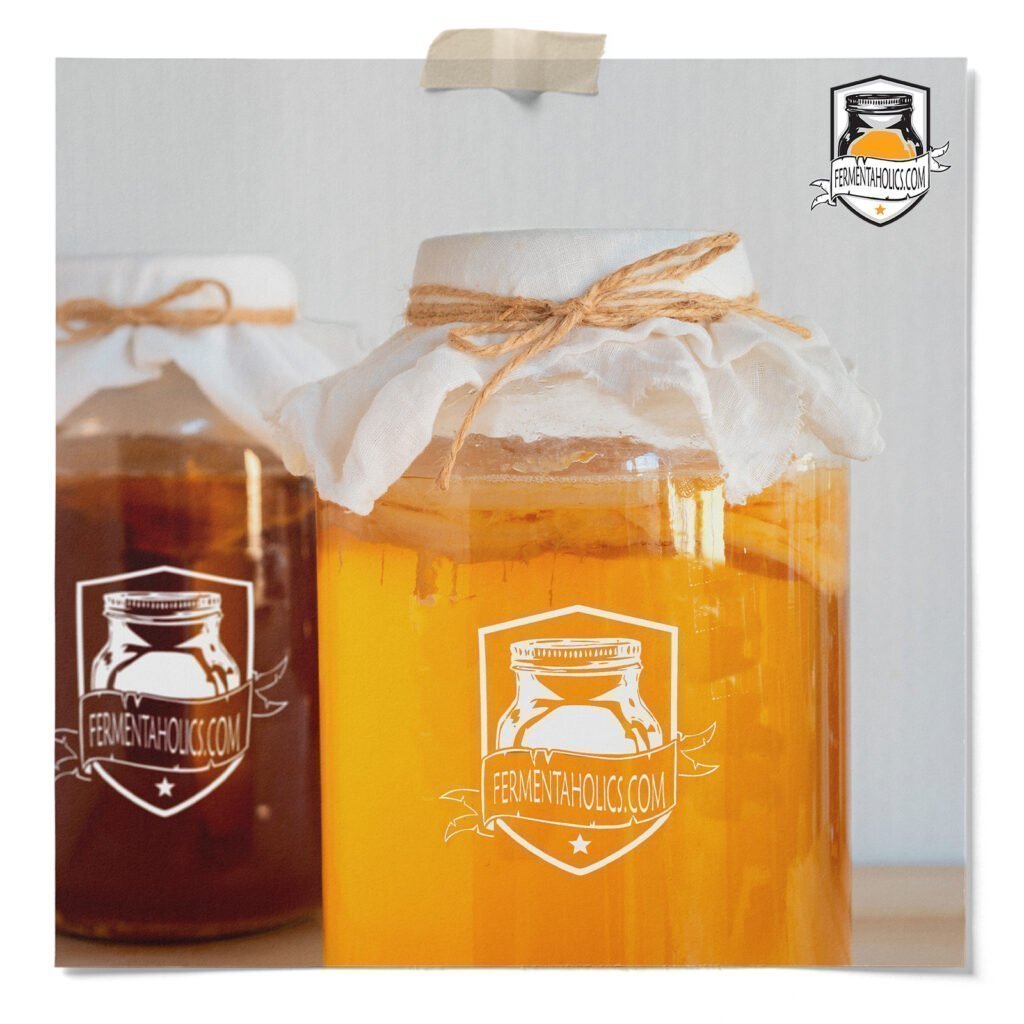
Today, we’ll be going over it and how it is made.
Kombucha is extremely easy to make; after all, it’s just fermented sweet tea. The majority of time brewers use the traditional kombucha recipe here. Traditional kombucha is made with black tea, sugar, water, and a kombucha starter culture or SCOBY. While not as popular, there are certainly other recipes out there that use different tea types, both traditional tea and herbal tea, in both the primary kombucha fermentation and second fermentation. Often alternate recipes aren’t used until a brewer has learned the traditional brewing process and then is ready to explore other options. This leads us to today’s topic.
Absolutely, you can brew kombucha with 100% green tea or a blend. Green tea and black tea are both made from the same plant – camellia sinensis. Black and green tea leaves are both picked, and the only difference from there is how the leaves are processed. When tea leaves are processed, they can be oxidized. As they oxidize, they progressively turn darker as the chlorophyll breaks down, and the tannins are released. So as you guessed it, red tea, known as traditional black tea in the west, is fully oxidized. Green tea isn’t oxidized. This is why green tea is much lighter and why it has a mild, delicate flavor. This lighter backdrop really gives your kombucha flavors a chance to shine through. Also, adding to the taste, the fizzy kombucha carbonation over the delicate green tea really brightens up the finished batch.
It’s important to note that while you can brew green tea kombucha, it’s not jun kombucha. What is jun kombucha? Jun kombucha tea is like kombucha’s classier cousin. Often referred to as the “champagne of kombucha,” jun has a crisper, brighter flavor than that of traditional kombucha. The difference is jun tea is brewed with a Jun SCOBY, green tea, and honey rather than a traditional kombucha culture, black tea, and cane sugar. The differences result in a delicate and delicious brew. Ready to brew jun kombucha? Visit our post here on how to make jun kombucha.
It’s simple, follow our kombucha recipe but swap out green tea in place of the black tea. You can use 100% green tea or blend it with black in any combination. A 50/50 blend works great.
1
Gallon Batch30
Minutes7 - 21
DaysKombucha Primary Fermentation One Gallon Green Tea Kombucha Recipe
1-Gallon Kombucha Brewing Jar, Small Pot, Breathable Kombucha Cloth Cover, And a Rubber Band.
1 Gallon Filtered Water*
1 Cup Organic Cane Sugar
2 Tablespoons Green Tea Or 6 Tea Bags
Kombucha SCOBY– 1.5 Cups Kombucha Starter Tea + SCOBY Pellicle
Thermometer Or Adhesive Temperature Strip
Kombucha Bottles – Pressure Holding, Airtight Bottles For The Secondary Fermentation, And Storing Your Finished Brew.
In a small pot, bring 2 cups of water to a boil – turn off and remove from heat.
Place green tea in the pot. If you’re using loose-leaf, you can use a tea ball to make removal easier.
Allow the tea to steep for 5-10 minutes, then remove from the pot.
Add the sugar and stir until it’s fully dissolved.
Pour the contents of the pot into the gallon brew jar.
Top the jar off with cool filtered water, making sure to leave room for your culture plus a little breathing room about 3 inches. Before you move on to the next step, the temperature of the tea should be below 85F.
Gently stir in your kombucha starter culture (kombucha SCOBY)
Using a spoon, remove a small amount of liquid from the brew jar to test the pH. If the pH reads 4.5 or below, continue to step 11. If the pH reads above 4.5, slowly add distilled white vinegar (never raw vinegar) and test until it reaches that point.
Secure the opening with a breathable cloth or coffee filter over the opening of the jar with a rubber band. This is important to keep bugs out and allow your ferment to breathe.
Place your brew jar undisturbed in a warm spot, out of direct sunlight for 7-21 days, brewing time depends on temperature.
After 7 days in the desired temperature range [75-85°F], it’s time to start taste testing. It should only be slightly sweet. If it tastes overly sweet, then it needs more time to ferment. Cover and check back daily until it reaches a balance of slightly sweet, slightly tart
When you’ve finished your primary fermentation, it’s time to move to the secondary fermentation. The secondary fermentation is where you flavor and carbonate your kombucha in air tight bottles.
Ready to bottle? Hop over to our post on how to bottle kombucha to learn how to do a secondary fermentation!
Green tea pairs perfectly with citrus and floral flavors. Green tea kombucha tastes great on its own, but don’t be afraid to experiment with other fruits and flowers to make your own favorite recipe. Here are a few of our favorites:
Since green tea kombucha, much like jun kombucha, is light and bright, flavors really shine through. So if you’re experimenting, we recommend using tropical fruits and citrus. Even floral flavors are a good choice with this brew. Here are a few of our recipes to add green tea kombucha to:
